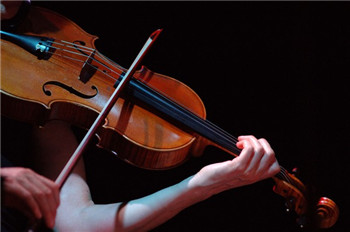(单词翻译:单击)

A cloud of dust swirled as I took down from the shelf the violin I crafted over the past two months. Bumping into an oily machine on the way, I squeezed through the dark workshop towards the farmland outside. The violin shined in the sunlight, and I admitted, reluctantly, that it looked good. But I knew it was a flaunting mockery of my failure to find beauty.
木屑四散飞扬,我从架子上取下了这把我花了两个月制作的提琴。我小心翼翼地侧身穿过这个幽暗狭窄的作坊,推开门走向外面的田野。在阳光下,琴身的油漆闪耀着,晶莹剔透。我不得不承认它很好看。但同时我深知,这“好看”仅仅流于肤浅,不过是在讥讽着我再一次无功而返罢了:我未能找到真正的美。
“What makes a violin beautiful?”
“为什么小提琴如此美?”
I first asked this question as a three-year-old child and now again as a 17-year-old teenager. When I listened to a violin for the first time, I was so stunned by its beauty that I imagined a fairy living within the wooden frame. But fairies faded when I grew older. I wanted a rational answer. In the past, I discovered the beauty of theater by writing scripts and producing shows. Perhaps the violin’s beauty could be found in a similar way.
我第一次问起这个问题的时候,还只是个三岁的孩子。那天,我第一次听到琴声时,它的美是如此震撼,以至于我确信那木盒子里一定住着一位仙女。然而,儿时的童话随着时间慢慢消逝,现在的我渴求一个理性的答案。物,何以感人?琴身按照一定频率的机械振动,却如何使我们共鸣,产生美的感受?我曾以参与制作戏剧的方式探索过舞台的美。也许,我也能以同样的方式体验小提琴的美?
I consulted Professor Ruan. My violin teacher and mentor since he introduced the violin to me 14 years ago, this 85-year-old man rhapsodized about the legend of Antonio Stradivari. “His violins are the most beautiful works humanity has ever crafted.” Captivated, I imagined a brightly-lit workshop with fine resin scents and a dedicated craftsman pouring his life’s passion into each violin. My excitement peaked when Professor Ruan introduced to me a violin workshop in the outskirts of Beijing.
我向阮老师寻求点拨。这位85岁的老人,我的恩师,正是14年前启蒙我音乐的人。他并没有直接回答我的问题,却娓娓道来,向我讲起制琴师安东尼奥·斯特拉迪瓦里的传说:“斯氏的提琴是人类创造美的巅峰。”我不禁想象着窗明几净的工作室里松脂的幽香,以及倾注一生心血追求每一把琴极致的大师。当阮老师把我介绍到京郊的一家小提琴作坊当学徒的时候,我难掩兴奋之情。
“Make a violin with your own hands,” Professor Ruan suggested. “When you play it, you will know.”
“用你自己的双手做一把琴吧,”阮老师说道,“当你第一次拉响它的时候,你就会明白了。”
What I saw though, was far from my expectation. The workshop was squalid, dark, and hot, its thick air pierced only by the machine noise. In front of me was a stout migrant worker, shirtless and sunburned, soon to become my master. “We produce fast. One hundred per month” he bragged, pointing at piles of wood reaching the rooftop. “All produced after Stradivari. Precisely.” Precise indeed, as I soon found that even two asymmetrical F holes, an accidental mistake of Stradivari, were meticulously copied. What shocked me most, though, was that the “master” knew nearly nothing about music. His rough hands had been tending crops, not instruments, for most of his life.
然而我见到的,却与我的期待天差地别。这作坊里肮脏,幽暗,闷热;那浑浊的空气似乎只有机器的轰鸣声才能穿透。在我面前迎接我的是一矮胖的农民工,光着膀子,浑身晒得黝黑:他是带我的师傅。“我们出活快得很,一个月能出一百把!”他夸耀着,指着从院子里堆到屋顶的一堆堆原木。“每把都是照着斯特拉迪瓦里来的,一分不差。”没错,的确是分毫不差:哪怕是斯氏晚年不小心切出的一个不对称音孔,也被仔仔细细的照搬了下来。每年全世界百分之九十的小提琴都在遍布在全国的类似的作坊里被批量生产,再被成批运到欧洲贴上牌子。最令我难以置信的是,我的“师傅”对音乐可以说是一窍不通。他粗糙的双手大半生都不是在制作乐器,而是在照顾庄稼。
Two months later, standing outside the workshop, I was disappointed. Yes, I just finished, or more accurately, copied, a Stradivarius violin. But how could I answer my question in a place utterly desolate of beauty?
两个月后,站在作坊门外,手拿着刚刚完成的提琴,我失望透顶。是的,我刚刚完成了,或者更准确的说,照抄了,一把斯氏小提琴。然而,在这个与美绝缘的城乡结合带,我又能如何找到我问题的答案呢?
Then I remembered Professor Ruan’s mysterious smile when he said, “When you play it, you will know.”
我突然想起了阮老师说“当你第一次拉响它的时候,你就会明白了”时,那捉摸不透的微笑。
I closed my eyes, and focused on where my fingers and strings touched. Music flowed suddenly, music so beautiful and so inconsistent with the violin’s humble origin that for a moment I doubted my own ears.
我合上双眼,聚精会神于指尖与琴弦交触的地方。忽然,音乐无端地开始流淌。这音乐是如此之美,然而这琴却来自于如此鄙陋的地方,我简直无法相信自己的耳朵。
Slowly I opened my eyes, and with surprise found the fairy of my childhood fantasy dancing with my music – the two-year-old daughter of the master. Her dress drifted, her smile beamed in a shower of golden sunlight. When she looked up at me with her eyes shining with excitement, a strange sense of deja vu overwhelmed me.
我慢慢睁开眼睛,惊讶的发现,我童年幻想中的仙女正在我面前伴着琴声起舞 —— 她是我师傅两岁多的女儿。她裙边摇摆,步子蹒跚,她的笑脸在金色的阳光中熠熠生辉。当她望向我的时候,眼中闪烁的激动让我突然觉得是如此的似曾相识。
I was reminded of that fine morning when Professor Ruan showed me the violin for the first time, back when I was three. An instrument with elegant curves and amber hue rested gently under his chin. Music flowed. My eyes opened wide, with an expression curiously similar to that of the dancing girl 14 years later. Memories, vivid and overpowering, revived and flooded inside me. My wet eyes felt warm in the brisk autumn wind.
我想起了那个晴朗的早晨,当阮老师第一次拉小提琴给我听的时候。我那时三岁。在他的颈间,枕着一把有着优美的曲线和琥珀般的光华的乐器。阳光洒进室内。琥珀闪耀着,晶莹剔透。音乐流淌。我睁大眼睛,眼睛里激动与生机与14年后小女孩的眼睛是如此相似。鲜活的回忆在我心中复活,难以抑制地喷薄而出。我的眼睛不觉在秋季清朗的风中湿润发热。
Professor Ruan was right. I didn't find beauty until I played music with the violin, because beauty is not in the instrument itself. It also has nothing to do with the surroundings, nor even the listener. When I caressed the strings, when the girl danced her spontaneous dance, when two souls met and inspired each other, beauty was incarnated. It’s just here, deep down, in ourselves.
阮老师是对的。直到我拉响小提琴的时候,我才终于找到美,因为美本就不在乐器中。美也与周遭的事物无关,甚至连和聆听的人是谁都没有关系。诗,言其志也。歌,咏其声也。舞,动其容也。三者本于心,然后乐器从之。当我抚摸琴弦;当那小女孩兴之所致,形诸舞咏;当两个灵魂相遇且相和,美就诞生了。它就在这儿,深深的,在我们这里。


